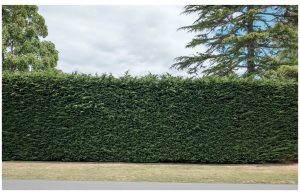In today's semantic news, I read a book calling itself a field guide a while ago, and then I read a GoodReads comment about that book, and now I have some questions. One question, in particular. Which is, what’s a field guide again?
The so-called field guide that started this commotion is called A Field Guide to Fields, and it purports to show “how different landscapes, climates, and cultures produced a variety of field types, from the terraced rice paddies of Southeast Asia to the impenetrable hedgerows of Northwest Europe…”. I learned many interesting things in this field guide. For instance: did you know that, in order to produce opium, poppies must be slashed at nighttime and their sap collected in the morning? Or about hedge menders, and how to date a hedge by counting the number of species within? Or about the “onion Johnnies” who’d carry as many onions as possible across their bicycle handlebars from northern France to English ports? Lots of interesting things inside this field book.
But, one of my least rewarding habits is that I like to read the worst reviews of books I really love (or, at least, am actively enjoying). One GoodReads user really raked this book over the coals in his one-star review, which I’d like to reproduce here for your entertainment:
“The term ‘Field Guide’ suggests careful taxonomic organization complete with enough descriptive detail to help one to see particular differences within general patterns, in short, much more of an agronomic discussion. This is not that book. What one does find are pages and pages of general information about the history of fields within human history, and as such one doesn't learn much that is new (unless one is a twenty-something computer guru who has read almost nothing that isn't connected to programming, IT, and related fields [pardon the pun]).”
After contemplating this review for a while, I concluded that Mr. One-star has a point: I usually see the title “field guide”, in the proper sense, attached to books with sharp nature photographs and scientific words. (Someone might consider warning this reviewer, and possibly everyone on Facebook, that condescension risks obscuring important points, though.)
So I looked in our library places for the definitive answer. The Oxford English Dictionary told me, amid pages of field-related content, that a field guide is “a book for use in the field.” Very good. Merriam-Webster, likewise, has determined that it is “a manual with descriptions and pictures for identifying plants, animals, or natural objects (as rocks) found in nature.” Okay.
But when I search “field guide” in LPL’s catalog, I get 127 results, some of which are related to fields but many of which are not. Some of the stranger ones include the following:
A Field Guide to Awkward Silences
This field guide tells us that "there are worse things out there than awkwardness." By out there, I'm assuming the author means out there... in the field.
The Opposite of Hate: A Field Guide to Repairing Our Humanity
This author conducts interviews with trolls, former terrorists, and white supremacists in the field, so maybe she has a claim to the term.
Stories in Stone: A Field Guide to Cemetery Symbolism and Iconography
Likewise, this one is meant to be used in an actual cemetery, which is kind of like a field...
Unladylike: A Field Guide to Smashing the Patriarchy and Claiming your Space
This one calls itself a "life guide." If you replace "life" with "field", it works.
The Mountain Man's Field Guide to Grammar
This one, at least, really tries to use the language of the field. "Conquer new frontiers with this fresh & outrageous take on grammar! (...) The Mountain Man's Field Guide to Grammar is the perfect trail guide to lead you safely through the tangles and gorges of the grammar wilderness." But what's an outrageous take on grammar?
I could get behind the "field" not being totally literal -- including, say, a field of study, or an electric field. But these books go much further than that. I’m forced to conclude, though I risk the resentment of grumps everywhere, that the field guide isn’t reserved for the meadow, prairie, or pasture anymore: now, the field is everywhere, and everything, and all the time, and we always need a guide to it.
Now I just need someone to tell me why "field guide" became so ubiquitous. Next up: A Field Guide to Field Guides.
-Hazlett Henderson is an Information Services Assistant at Lawrence Public Library.





Add a comment to: What’s a Field Guide Again?